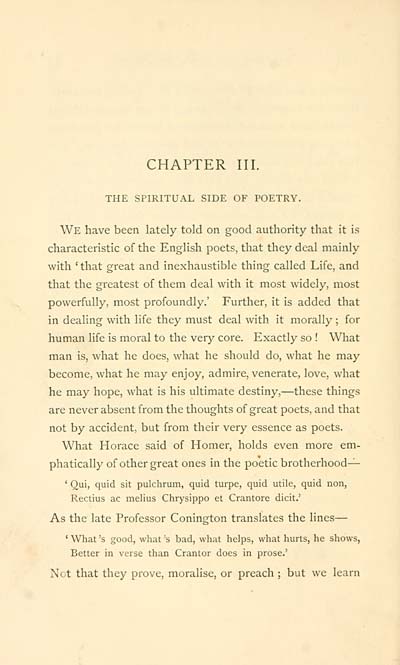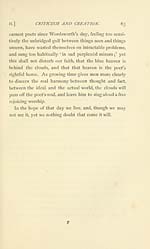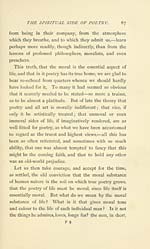Download files
Complete book:
Individual page:
Thumbnail gallery: Grid view | List view

CHAPTER III.
THE SPIRITUAL SIDE OF POETRY,
We have been lately told on good authority that it is
characteristic of the English poets, that they deal mainly
with ' that great and inexhaustible thing called Life, and
that the greatest of them deal with it most widely, most
powerfully, most profoundly.' Further, it is added that
in dealing with life they must deal with it morally ; for
human life is moral to the very core. Exactly so ! What
man is, what he does, what he should do, what he may
become, what he may enjoy, admire, venerate, love, what
he may hope, what is his ultimate destiny, — these things
are never absent from the thoughts of great poets, and that
not by accident, but from their very essence as poets.
What Horace said of Homer, holds even more em-
phatically of other great ones in the poetic brotherhood—
* Qui, quid sit pulchrum, quid turpe, quid utile, quid non,
Rectius ac melius Chrysippo et Crantore dicit.'
As the late Professor Conington translates the lines —
' What 's good, what 's bad, what helps, what hurts, he shows,
Better in verse than Grantor does in prose.'
Not that they prove, moralise, or preach ; but we learn
THE SPIRITUAL SIDE OF POETRY,
We have been lately told on good authority that it is
characteristic of the English poets, that they deal mainly
with ' that great and inexhaustible thing called Life, and
that the greatest of them deal with it most widely, most
powerfully, most profoundly.' Further, it is added that
in dealing with life they must deal with it morally ; for
human life is moral to the very core. Exactly so ! What
man is, what he does, what he should do, what he may
become, what he may enjoy, admire, venerate, love, what
he may hope, what is his ultimate destiny, — these things
are never absent from the thoughts of great poets, and that
not by accident, but from their very essence as poets.
What Horace said of Homer, holds even more em-
phatically of other great ones in the poetic brotherhood—
* Qui, quid sit pulchrum, quid turpe, quid utile, quid non,
Rectius ac melius Chrysippo et Crantore dicit.'
As the late Professor Conington translates the lines —
' What 's good, what 's bad, what helps, what hurts, he shows,
Better in verse than Grantor does in prose.'
Not that they prove, moralise, or preach ; but we learn
Set display mode to: Large image | Transcription
Images and transcriptions on this page, including medium image downloads, may be used under the Creative Commons Attribution 4.0 International Licence unless otherwise stated. ![]()
| Early Gaelic Book Collections > Ossian Collection > Aspects of poetry > (82) |
|---|
| Permanent URL | https://digital.nls.uk/78386256 |
|---|
| Description | Selected books from the Ossian Collection of 327 volumes, originally assembled by J. Norman Methven of Perth. Different editions and translations of James MacPherson's epic poem 'Ossian', some with a map of the 'Kingdom of Connor'. Also secondary material relating to Ossianic poetry and the Ossian controversy. |
|---|
| Description | Selected items from five 'Special and Named Printed Collections'. Includes books in Gaelic and other Celtic languages, works about the Gaels, their languages, literature, culture and history. |
|---|

